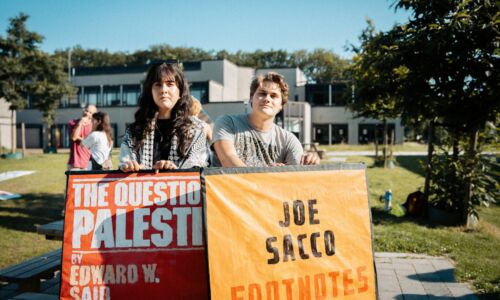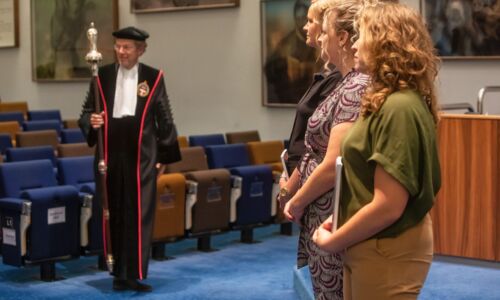Gerard Meijer looks forward to scoring again
-
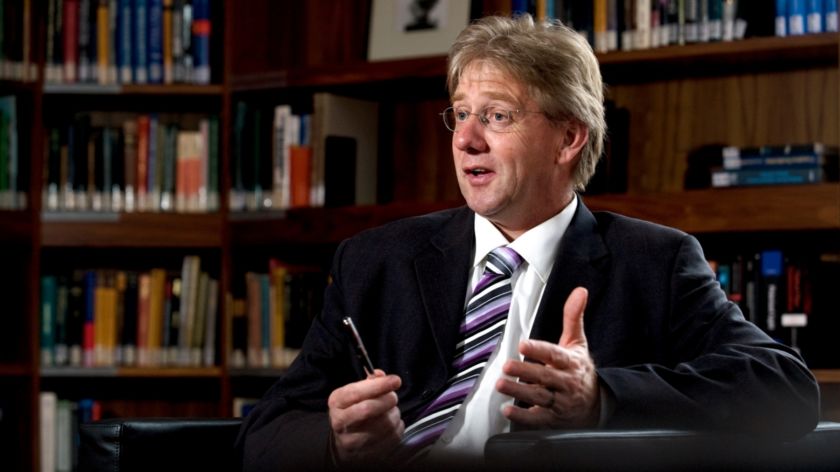 Gerard Meijer in Berlin, 2012. Photo: Charles Yunck
Gerard Meijer in Berlin, 2012. Photo: Charles Yunck
President of the Executive Board Gerard Meijer (54) is taking his leave today. What questions do his colleagues still want to ask him? VOX used these as the basis for the present interview. “It’s a good thing I’m going back into research. At least there I understand what’s going on.”
Stef Olsthoorn, Head of the Techno Centre and football team-mate: On the football field you are an excellent playmaker, with insight and a fantastic pass. This seems to me an ideal skill when translated to your work as President of the Executive Board. But you are also a player who likes to score. How did you cope with this as Executive Board President?
‘Of all metaphors, football metaphors are my favourite. You might say I moved from being a team player to being president of the club. Once you don’t get to score anymore yourself, you have to derive motivation from the fact that the club is doing well. This is something you have to learn, especially if you were raised in an environment where determining the results yourself was considered essential. It has been quite a process. I now feel proud when the University wins an ERC grant or a Spinoza Prize. I think: ‘It’s fantastic!’’
VOX: Do you also think: I contributed to this success?
‘Yes, but much less directly: through good management and giving people the opportunity to shine. I’ve missed being able to score myself. I know how it feels when your PhD student defends his or her thesis, or when your article is published in a leading journal. As President of the Executive Board, you have to score on a different level. By creating programmes such as the Excellence Initiative, or by standing up for Open Access. This is satisfying in a different way.’
VOX: Less satisfying?
‘Yes less satisfying. Which is part of the reason I’ve decided to go back into research. At the end of the day, I just enjoy it more. Management is important and it’s vital that it’s done well – clearly someone has to do it. But that someone doesn’t necessarily have to be me.’
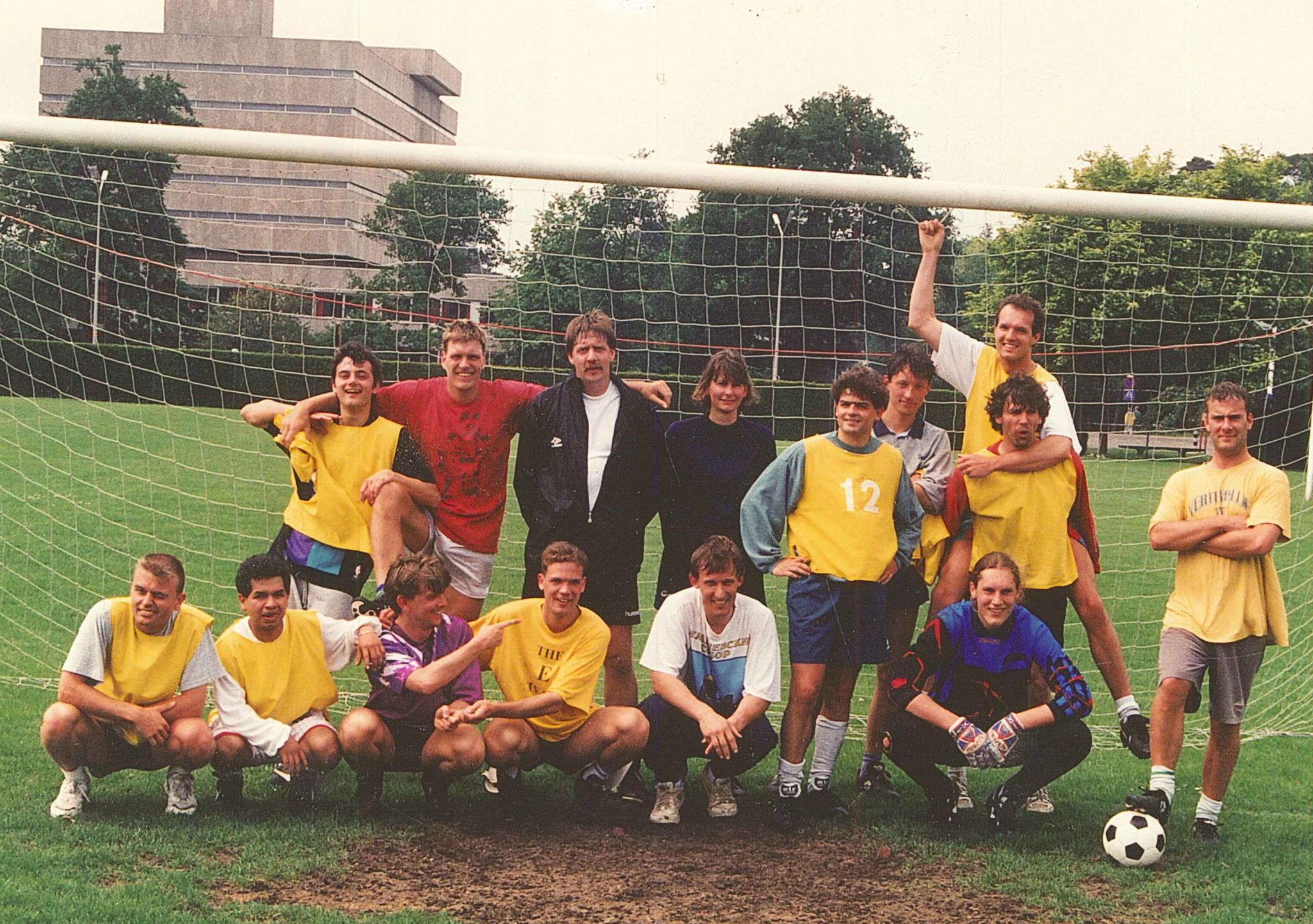
Bas Kortmann, former Rector Magnificus and board colleague until 2014: Wouldn’t you have preferred to be Rector Magnificus/President as in the Leiden model? Combining the two functions?
‘I understand why he would ask that. A researcher taking on the role of President of the Executive Board will have a lot of overlap with the job of the Rector, who is responsible for teaching and research. How well this works depends very much on who you are dealing with. With Bas, who was already there when I came, I never had any problems. He taught me so much, and we never got in each other’s way. With respect to teaching: I have an affinity with it in the sense that I like to teach, but I have less affinity with the organisational side of things. How the study programmes are structured, how to deal with Examination Boards, and all that. So I didn’t mind the Rector being responsible for that. I do have this kind of affinity with organising research, despite the fact that this clearly falls under the responsibility of the Rector. So it was important for us to be able to reach good agreements. The disadvantage of the Leiden model is that the President has so many tasks, and doing the work of two people on a Board is not particularly easy. I think a University benefits most from a really collegial board on which all three members are equally visible. This means that you have to look carefully at the composition and distribution of tasks.’
VOX: With Theo Engelen, Bas Kortmann’s successor, things did go wrong. Was that because you got in each other’s way?
‘No, it was due to other factors.’
(Meijer does not wish to elaborate on this because when Engelen left it was agreed that both parties would refrain from commenting on the matter.)
VOX: What kind of manager should the University look for now that you are leaving?
‘The current Rector Magnificus Han van Krieken and I overlap quite a lot. He comes from the medical world, and I’m a scientist too. We both have experience running large-scale research institutes. I think that he is the right person to take over some of my activities on behalf of Radboud University. I am personally in favour of a President with an academic background, because it makes it easier to gain the respect of researchers and to understand what is really at stake. But it should also be someone with an affinity for politics. This is something we are a bit short of at the moment.’
VOX: You had no experience of The Hague politics. How did you manage?
‘I’ve had to learn about politics. My predecessor Roelof de Wijkerslooth helped me work myself in. Thanks to the negotiations on behalf of the universities with Elsevier regarding Open Access, I built a solid contact network, for example with State Secretary Sander Dekker. Radboud University became much more visible in The Hague, although this did take some time. It’s not my world, though. Politicians often have a double agenda, and they are not always honest.’
Physicist Janneke Blokland, former post-doc in Berlin and now pastor in the UK: What were the most inspiring moments and meetings of your career as President? Were there conversations or moments that confirmed you in what you were doing, or moments when you decided to radically change course?
‘One example was my interaction with Sander Dekker. He did a lot to promote Open Access. Later it turned out he was prepared to let the Ministry of Economic Affairs sign the new NWO law. I let him know that I disagreed on principle and that I thought it essential that this should remain a matter for the Ministry of Education, Culture and Science, but he simply ignored my objections. He even wanted to send a quick letter on valorisation policy to the House of Representatives. It was only then that I understood that he was trying to position himself as the next Minister of Economic Affairs, and that he was prepared to sacrifice the crown jewels of his current ministry to do so. That was one of those moments when I thought: I don’t want to have anything to do with this; just as well I’m going back to research. At least there I understand what’s going on.
I wanted to complete the four-year cycle at Radboud University; I believed it was my duty.
Having said that: I have deep respect for Angela Merkel. She is a researcher occupying what might well be the most important political position in the world. I’ve met her on a number of occasions and I’ve always been very impressed with how genuinely she wants the best for her country and for Europe. Not for herself. It has been a great source of inspiration for me to see someone perform this function with such drive and dedication.’
VOX: You might think: I want to make this kind of difference in the Netherlands. And yet you are going back to Berlin to conduct research. Why?
‘When I was asked by Nijmegen to become President of the Executive Board, I decided to take on the position without thinking where it would lead next. After a year or two, I did begin to wonder what my next step would be. I realised that my heart was in research rather than management. I wanted to complete the four-year cycle at Radboud University; I believed it was my duty. But I also thought: I’m not going to spend the rest of my career in this environment, with all this political intrigue. I’m going to do what I really enjoy doing and what I’m best at. I will finish things off here, and then I’m off.’
VOX: One of your colleagues in Berlin said in 2012 in response to your relocation to Nijmegen: this job is coming too soon for Gerard. Was he right?
‘Of course I did wonder about that myself too. I was fifty when I accepted this position. If I had been sixty at the time, I would probably not have considered going back into research after four years. Then this opportunity came up, and I was tempted. Maybe fifty is relatively young for such a position.’
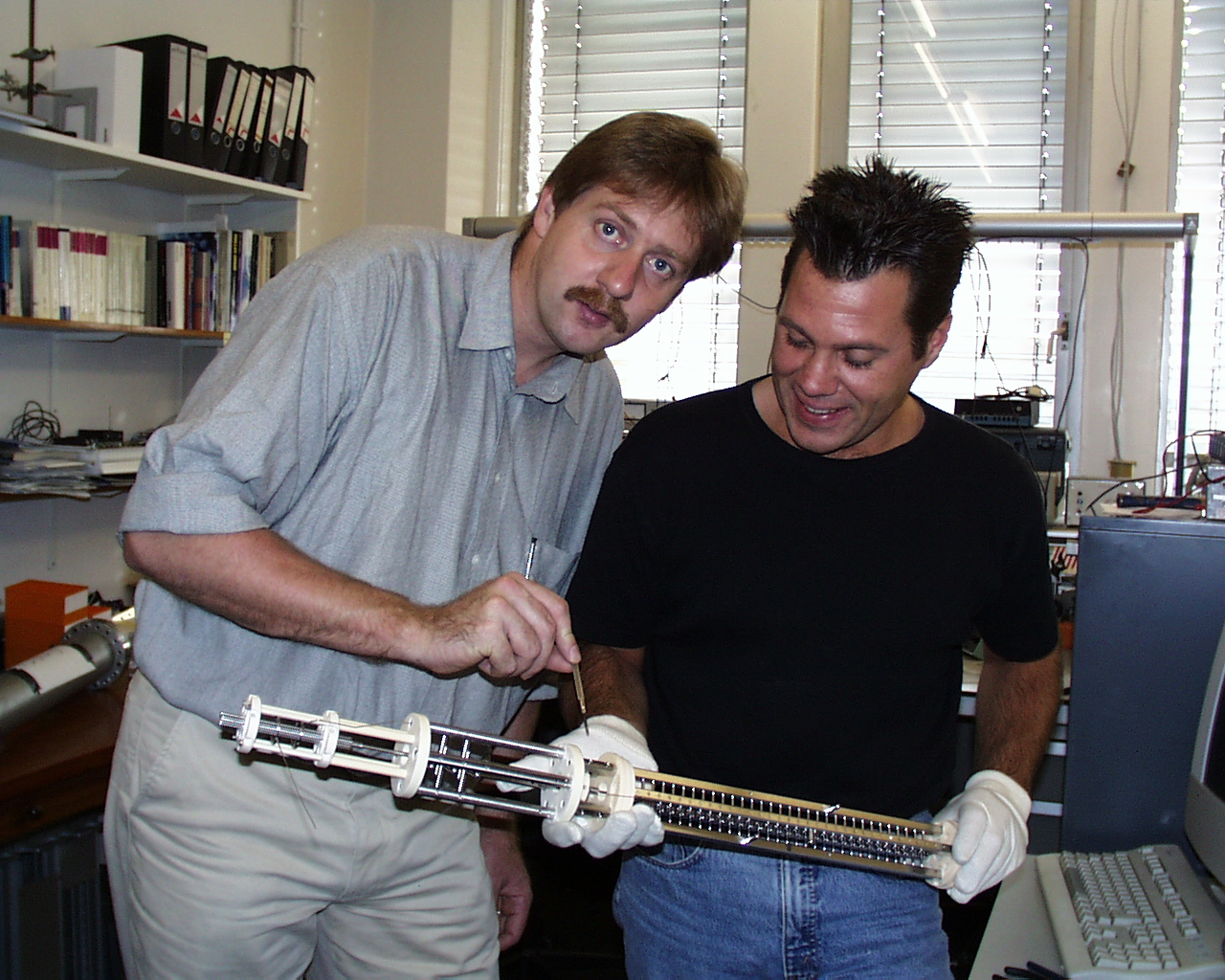
Mihai Netea, Professor of Experimental Internal Medicine and Spinoza Prize winner (2016): What can the German academic world learn from us, and vice versa?
‘The Netherlands sets an example for other countries when it comes to conducting joint scientific projects. Researchers often have huge egos, but in the Netherlands, we manage to get them to agree on what they should do and how to share their research equipment. The Netherlands gives young researchers more opportunities to distinguish themselves at an early stage, because there are fewer big bosses who have to control entire departments. We are also very good when it comes to research incentives, in particular the VENI, VIDI and ERC starting grants. The Netherlands spends relatively little money on fundamental research, but this doesn’t stop us from doing well in the international competition, thanks to our polder model.’
VOX: And the other way around? What can the Netherlands learn from Germany?
‘I have always tried to make it clear that research benefits from continuity and stability in funding and policy. You don’t want one thing today and another thing tomorrow. You have to be able and dare to think long-term. This doesn’t fit with Dutch politics, but it does with German politics. German politics may be more boring, but it is more stable. There is more respect and trust in professionals in the widest sense, including researchers.’
VOX: Over the past years the Netherlands has grown into a country where research is ‘just another opinion’.
‘Yes, I think it’s terrible, this lack of respect and trust. It means you have to create all kinds of mechanisms to control professionals. You could also not do it, save yourself a lot of money and hassle, and let people take the responsibility. In my opinion this is precisely what we have done at Radboud University with the directors and deans. And it leads to much better results.’
Marian Janssen, Head of International Office until 2016: One of your aims was to improve internationalisation at Radboud University. We are now headed in the right direction, but what do you really wish you had accomplished?
‘This year we acquired a lot more international students thanks to our new English-language Bachelor’s programmes and we gained more international visibility by creating a more distinct profile for ourselves. What I am concerned about is that not all segments of the academic community are following suit. Look at student associations for example. It should be possible to join Phocas for three months. I think that a traditional association like Carolus has an exemplary role to play here. We have to make sure that international students don’t become isolated.’
VOX: What do you really wish you had accomplished?
‘This question presupposes that what we did accomplish was not enough. I don’t think that’s true at all. I thought we needed to take some major steps with respect to internalisation, and we looked at what was realistic. It’s difficult to measure our international visibility; I only know that we are now much more visible abroad. If you see internationalisation as a process that could take ten, twenty years, then I believe we have made considerable progress over the past four years.’
VOX: One of your achievements is the Radboud Excellence Initiative, which allows top researchers from all over the world to work in Nijmegen for two years. Are you happy with how this project has turned out?
‘Yes. We are now busy with the seventh round. Over the past years we have been successful in attracting both postdocs and professors to Nijmegen and I think that in the long run this will certainly contribute to our branding and international image. I hope this network will continue to grow further.’
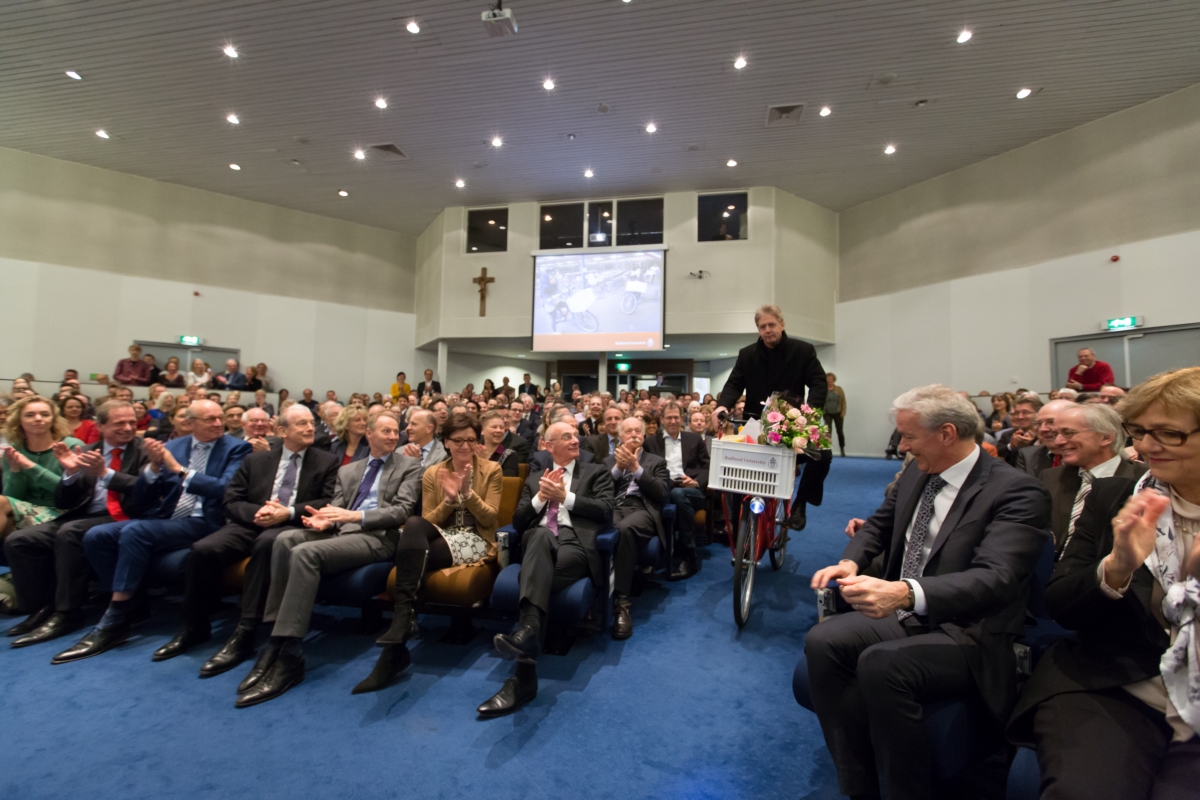
Mark Vlek de Coningh, President of the University Student Council 2014-2015: What did you learn from your consultation and interaction with students?
‘That they are honest and fair. Sometimes a little naive, but that isn’t surprising since they are young. I’ve tried to put myself in their shoes more often. Change perspective. The Student Council has a number of different parties, but they are all equally committed to the University. I always considered informal consultation to be very important. Just going for a walk and asking: What makes you say what you are saying?’
Bas Kortmann had warned me that teaching was not really compatible with my position.
VOX: You also did some teaching. What did you learn from this?
‘I taught twice for a semester. I loved the lectures, but they took up so much time! And marking exams was horrible. I had 120 to 130 students, and open exams that had to be marked within two weeks. Bas Kortmann had warned me that teaching was not really compatible with my position. But I did it anyway. I had to get up at 4 a.m. to mark papers until 7 a.m. And every weekend too. What had I gotten myself into? But it was good to know what it’s like for lecturers, to actually use Blackboard and Osiris myself rather than just talk about the procurement of these programs.’
VOX: Will we see you again after your official farewell on 9 January?
‘I will remain affiliated with Radboud University as a professor with a zero-hours contract. I will also be around on a regular basis because my parents live in the Achterhoek, and I come to Nijmegen for PhD defences. Over the past years we’ve put a lot of energy into our vision on campus development. A new Social Sciences building is on the agenda, as well as a move to the Berchmanianum. We have defined what we want to happen over the next six to seven years. I look forward to coming back.’
The last question comes from Stef Olsthoorn: NEC or De Graafschap?
‘The Superboeren [‘Super Farmers’, the nickname of De Graafschap].’ (He laughs).

